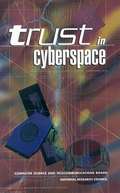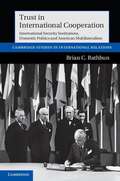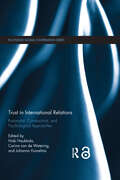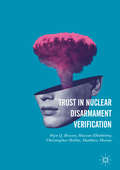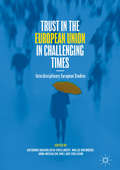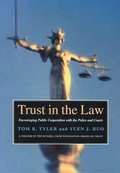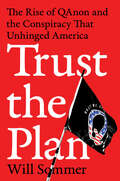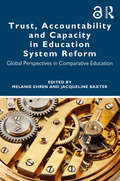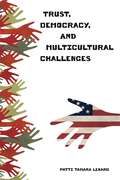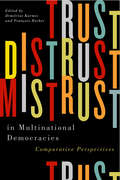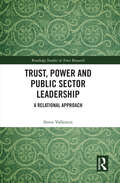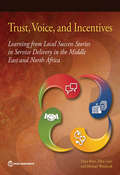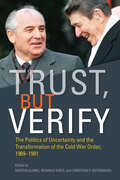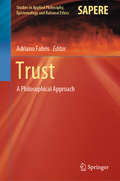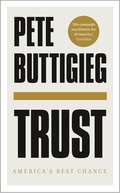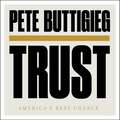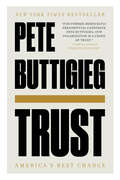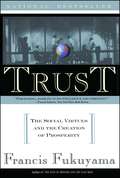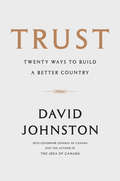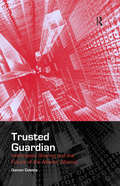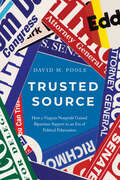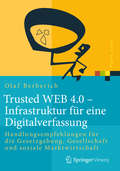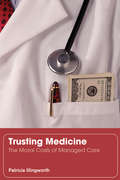- Table View
- List View
Trust in Cyberspace
by National Research CouncilWhether or not you use a computer, you probably use a telephone, electric power, and a bank. Although you may not be aware of their presence, networked computer systems are increasingly becoming an integral part of your daily life. Yet, if such systems perform poorly or don't work at all, then they can put life, liberty, and property at tremendous risk. Is the trust that we--as individuals and as a society--are placing in networked computer systems justified? And if it isn't, what can we do to make such systems more trustworthy?This book provides an assessment of the current state of the art procedures for building trustworthy networked information systems. It proposes directions for research in computer and network security, software technology, and system architecture. In addition, the book assesses current technical and market trends in order to better inform public policy as to where progress is likely and where incentives could help. Trust in Cyberspace offers insights into:--The strengths and vulnerabilities of the telephone network and Internet, the two likely building blocks of any networked information system.--The interplay between various dimensions of trustworthiness: environmental disruption, operator error, "buggy" software, and hostile attack.--The implications for trustworthiness of anticipated developments in hardware and software technology, including the consequences of mobile code.--The shifts in security technology and research resulting from replacing centralized mainframes with networks of computers.--The heightened concern for integrity and availability where once only secrecy mattered.--The way in which federal research funding levels and practices have affected the evolution and current state of the science and technology base in this area.You will want to read this book if your life is touched in any way by computers or telecommunications. But then, whose life isn't?
Trust in Early Modern International Political Thought, 1598–1713 (Ideas in Context)
by Peter SchröderCan there ever be trust between states? This study explores the concept of trust across different and sometimes antagonistic genres of international political thought during the seventeenth century. The natural law and reason of state traditions worked on different assumptions, but they mutually influenced each other. How have these traditions influenced the different concepts and discussions of trust-building? Bringing together international political thought and international law, Schröder analyses to what extent trust can be seen as one of the foundational concepts in the theorising of interstate relations in this decisive period. Despite the ongoing search for conditions of trust between states, we are still faced with the same structural problems. This study is therefore of interest not only to specialists and students of the early modern period, but also to everyone thinking about ways of overcoming conflicts which are aggravated by a lack of mutual trust. Offers a fresh analysis of the history of seventeenth-century international political thought, which will appeal widely across international law as well as early modern and intellectual history. Establishes trust - and mistrust - as an important concept within political discourse. Draws on a wide range of sources, providing a fresh interpretation of classic texts as well as discussion of neglected thinkers.
Trust in International Cooperation
by Brian C. RathbunTrust in International Cooperation challenges conventional wisdoms concerning the part which trust plays in international cooperation and the origins of American multilateralism. Brian C. Rathbun questions rational institutionalist arguments, demonstrating that trust precedes rather than follows the creation of international organizations. Drawing on social psychology, he shows that individuals placed in the same structural circumstances show markedly different propensities to cooperate based on their beliefs about the trustworthiness of others. Linking this finding to political psychology, Rathbun explains why liberals generally pursue a more multilateral foreign policy than conservatives, evident in the Democratic Party's greater support for a genuinely multilateral League of Nations, United Nations and North Atlantic Treaty Organization. Rathbun argues that the post-World War Two bipartisan consensus on multilateralism is a myth, and differences between the parties are growing continually starker.
Trust in International Relations: Rationalist, Constructivist, and Psychological Approaches (ISSN)
by Johanna Vuorelma Hiski Haukkala Carina van de WeteringTrust is a core concept in International Relations (IR), representing a key ingredient in state relations. It was only relatively recently that IR scholars began to probe what trust really is, how it can be studied, and how it affects state relations. In the process three distinct ways of theorising trust in IR have emerged: trust as a rational choice calculation, as a social phenomenon or as a psychological dimension. Trust in International Relations explores trust through these different lenses using case studies to analyse the relative strengths and weaknesses of different approaches. The case studies cover relations between: United States and India ASEAN and Southeast Asian countries Finland and Sweden USA and Egypt The European Union and Russia Turkey’s relations with the West This book provides insights with real-world relevance in the fields of crisis and conflict management, and will be of great interest for students and scholars of IR, security studies and development studies who are looking to develop a more sophisticated understanding of how different theories of trust can be used in different situations.The Open Access version of this book, available at http://www.taylorfrancis.com, has been made available under a Creative Commons Attribution-Non Commercial-No Derivatives (CC-BY) 4.0 license.
Trust in Nuclear Disarmament Verification
by Christopher Hobbs Matthew Moran Wyn Q. Bowen Hassan ElbahtimyThis book explores how human factors, in particular the contested notion of trust, influence the conduct and practice of arms control verification. In the nuclear arena, disarmament verification is often viewed purely in terms of a dispassionate, scientific process. Yet this view is fundamentally flawed since the technical impossibility of 100 per cent verification opens the door to a host of complex issues and questions regarding the process and its outcomes. Central among these is the fact that those involved in any verification inspection process must inevitably conduct their work in a space that falls well short of absolute certainty. The lines between scientific enquiry and human psychology can become blurred here and outcomes have the potential to be influenced by perceptions. Drawing on extensive empirical evidence, the authors explore the complex interplay between evidence-based judgements and perceptions of intentions that overshadows the science of verification. The book provides new insights into the role and influence of human factors in the verification process and sheds light on the 'blind spot' of verification research. It is an invaluable resource for practitioners, academics and students working in the fields of arms control and disarmament. ns concerning nuclear disarmament.
Trust in the European Union in Challenging Times: Interdisciplinary European Studies
by Lars Oxelheim Anna Michalski Antonina Bakardjieva Engelbrekt Niklas Bremberg<p>This is the first book in the Interdisciplinary European Studies collection. This volume provides an interdisciplinary perspective on trust in the EU from the vantage point of political science, law and economics. It applies insights from a number of different dimensions – political institutions, legal convergence in criminal and civil law, social trust, digitalization, the diffusion of political values and norms, monetary convergence and the legitimacy of political systems – to approach the highly complex issue of trust in the EU in a clear-sighted, relevant and insightful manner. <p>Written by renowned experts in the field, the style is accessible and reader-friendly, yet concise, knowledgeable and thought-provoking. The individual chapters combine up-to-date research findings with reflections on on-going political debates and offer useful, concrete ideas on what steps the EU could take to address the challenge of trust. The book provides the reader with invaluable insights into how trust, or rather the lack of trust, poses a challenge to the future of the social, economic and political developments in the EU. It is a must-read for policy-makers, students and interested members of the public who feel concerned by the future of Europe.</p>
Trust in the Law: Encouraging Public Cooperation with the Police and Courts
by Tom R. Tyler Yuen J. HuoBased on a wide-ranging survey of citizens who had recent contact with the police or courts in Oakland and Los Angeles, Trust in the Law examines the sources of people’s favorable and unfavorable reactions to their encounters with legal authorities. Tyler and Huo address the issue from a variety of angles: the psychology of decision acceptance, the importance of individual personal experiences, and the role of ethnic group identification. They find that people react primarily to whether or not they are treated with dignity and respect, and the degree to which they feel they have been treated fairly helps to shape their acceptance of the legal process. Their findings show significantly less willingness on the part of minority group members who feel they have been treated unfairly to trust the motives to subsequent legal decisions of law enforcement authorities.
Trust the Plan: The Rise of QAnon and the Conspiracy That Unhinged America
by Will Sommer"A story so bizarre, only Will Sommer could report it.” —Molly Jong-FastThe definitive book on QAnon from the reporter knows them best; Will Sommer explains what it is, how it has gained a mainstream following among Republican lawmakers and ordinary citizens, the threat it poses to democracy, and how we can reach those who have embraced the conspiracy and are disseminating its lies.The Storm is Coming. Trust the Plan. WWG1WGA. You’ve seen the letter Q on TV and in the news – it’s been everywhere from Trump rallies to the January 6th insurrection. “QAnon” used to sound vaguely familiar, somewhat ominous, but not quite mainstream. But what was once a fringe conspiracy theory has now become a household name and its symbols recognizable around the world. How did this happen, who is actually involved, what do they believe, and what do they want?Daily Beast reporter Will Sommer has been on the ground with Q’s followers since day one, and in Trust the Plan Sommer has written the definitive book on the movement—who started it and who grew it, what they really believe is going on, and what they want to see “the Storm” accomplish on the day of its reckoning. At once a character study and a journalistic exposé, Sommer lets his cast of characters do the talking as he visits them around the world, from their makeshift compounds to the rallies they are still holding.The great tragedy of this story is ultimately the legitimization of this ideology by mainstream politicians eager to gain access to a large and growing cohort of voters. Though 2020 brought the end of Trump’s presidency, his following within the QAnon community has simply pivoted and grown stronger. Trust the Plan shows us in granular detail who we’ll be up against for years to come, in the US and abroad. Understanding why and how something like Q happens is an indispensable exercise, and in showing us how we got here we can chart a path out.
Trust, Accountability and Capacity in Education System Reform: Global Perspectives in Comparative Education
by Jacqueline Baxter Melanie EhrenThis global collection brings a new perspective to the field of comparative education by presenting trust, capacity and accountability as the three building blocks of education systems and education system reform. In exploring how these three factors relate to student learning outcomes across different international contexts, this book provides a powerful framework for a more equal system. Drawing upon research and case studies from scholars, policymakers and experts from international agencies across five continents, this book shows how trust, capacity and accountability interact in ways and with consequences that vary among countries, pointing readers towards understanding potential leverage points for system change. Trust, Accountability, and Capacity in Education System Reform illuminates how these three concepts are embedded in an institutional context temporally, socially and institutionally and offers an analysis that will be of use to researchers, policymakers and agencies working in comparative education and towards education system reform.
Trust, Democracy, and Multicultural Challenges
by Patti Tamara LenardBanning minarets by referendum in Switzerland, publicly burning Korans in the United States, prohibiting kirpans in public spaces in Canada—these are all examples of the rising backlash against diversity that is spreading across multicultural societies. Trust has always been precarious, and never more so than as a result of increased immigration. The number of religions, races, ethnicities, and cultures living together in democratic communities and governed by shared political institutions is rising. The failure to construct public policy to cope with this diversity—to ensure that trust can withstand the pressure that diversity can pose—is a failure of democracy. The threat to trust originates in the perception that the values and norms that should underpin a public culture are no longer truly shared. Therefore, societies must focus on building trust through a revitalized public culture. In Trust, Democracy, and Multicultural Challenges, Patti Tamara Lenard plots a course for this revitalization. She argues that trust is at the center of effective democratic politics, that increasing ethnocultural diversity as a result of immigration may generate distrust, and therefore that democratic communities must work to generate the conditions under which trust between newcomers and “native” citizens can be built, so that the quality of democracy is sustained.
Trust, Distrust, and Mistrust in Multinational Democracies: Comparative Perspectives (Democracy, Diversity, and Citizen Engagement Series #4)
by Dimitrios Karmis François RocherThe importance of research on the notion of trust has grown considerably in the social sciences over the last three decades. Much has been said about the decline of political trust in democracies and intense debates have occurred about the nature and complexity of the relationship between trust and democracy. Political trust is usually understood as trust in political institutions (including trust in political actors that inhabit the institutions), trust between citizens, and to a lesser extent, trust between groups. However, the literature on trust has given no special attention to the issue of trust between minority and majority nations in multinational democracies – countries that are not only multicultural but also constitutional associations containing two or more nations or peoples whose members claim to be self-governing and have the right of self-determination. This volume, part of the work of the Groupe de recherche sur les sociétés plurinationales (GRSP), is a comparative study of trust, distrust, and mistrust in multinational democracies, centring on Canada, Belgium, Spain, and the United Kingdom. Beliefs, attitudes, practices, and relations of trust, distrust, and mistrust are studied as situated, interacting, and coexisting phenomena that change over time and space. Contributors include Dario Castiglione (Exeter), Jérôme Couture (INRS-UCS), Kris Deschouwer (Vrije Universiteit Brussel), Jean Leclair (Montréal), Patti Tamara Lenard (Ottawa), Niels Morsink (Antwerp), Geneviève Nootens (Chicoutimi), Darren O’Toole (Ottawa), Alexandre Pelletier (Toronto), Réjean Pelletier (Laval), Philip Resnick (UBC), David Robichaud (Ottawa), Peter Russell (Toronto), Richard Simeon (Toronto), Dave Sinardet (Vrije Universiteit Brussel), and Jeremy Webber (Victoria).
Trust, Power and Public Sector Leadership: A Relational Approach (Routledge Studies in Trust Research)
by Steen VallentinTrust, Power and Public Sector Leadership: A Relational Approach provides a critical theoretical treatment of trust in the realm of public management and governance. The public trust agenda is an antidote to rampant bureaucratic control and, in particular, the marketization and instrumentalization associated with New Public Management. The book approaches trust from a relational perspective that draws on insights from trust research, modern sociology and organization and management theory, while lending support to developments in New Public Governance. It provides a theoretical framework that distinguishes between institutional, economic, moral and relational trust and shows how a relational perspective is able to incorporate insights from the other paradigms in an inclusive approach to trust processes. Apart from providing a theoretical reading of the workings of trust in public organizations, the book addresses how trust relates to power and control along with notions of debureaucratization, post-bureaucratic organization and post-heroic leadership. It also shows how the trust agenda, in theory and practice, is related to social capital and thus efforts to strengthen social relations and collaboration in and around public organizations. Speaking of practice, the book takes its empirical point of departure in the Danish public sector. However, the aim of the book is not to promote the "High trust" Danish case as a benchmark or best practice. The aim is to theorize and help make sense of this particular experience by applying general theory to it and extracting general insights – with broader application – from its particular manifestations and outcomes. There is a need for more elaborate theorizing about trust and power in a public sector setting, and the Danish experience is useful as a starting point for this ambition.
Trust, Voice, and Incentives
by Michael Woolcock Ellen Lust Hana BrixiThis report examines the role of incentives, trust, and engagement as critical determinants of service delivery performance in MENA countries. Focusing on education and health, the report illustrates how the weak external and internal accountability undermines policy implementation and service delivery performance and how such a cycle of poor performance can be counteracted. Case studies of local success reveal the importance of both formal and informal accountability relationships and the role of local leadership in inspiring and institutionalizing incentives toward better service delivery performance. Enhancing services for MENA citizens requires forging a stronger social contract among public servants, citizens, and service providers while empowering communities and local leaders to find 'best fit' solutions. Learning from the variations within countries, especially the outstanding local successes, can serve as a solid basis for new ideas and inspiration for improving service delivery. Such learning may help the World Bank Group and other donors as well as national and local leaders and civil society, in developing ways to enhance the trust, voice, and incentives for service delivery to meet citizens' needs and expectations.
Trust, but Verify: The Politics of Uncertainty and the Transformation of the Cold War Order, 1969-1991
by Martin Klimke Christian Ostermann Reinhild KreisTrust, but Verify uses trust--with its emotional and predictive aspects--to explore international relations in the second half of the Cold War, beginning with the late 1960s. The détente of the 1970s led to the development of some limited trust between the United States and the Soviet Union, which lessened international tensions and enabled advances in areas such as arms control. However, it also created uncertainty in other areas, especially on the part of smaller states that depended on their alliance leaders for protection. The contributors to this volume look at how the "emotional" side of the conflict affected the dynamics of various Cold War relations: between the superpowers, within the two ideological blocs, and inside individual countries on the margins of the East-West confrontation.
Trust: A Philosophical Approach (Studies in Applied Philosophy, Epistemology and Rational Ethics #54)
by Adriano FabrisThis book presents cutting-edge concepts on the question of trust. Written by leading experts, it investigates a paradoxical feature of contemporary society: while information and communication technologies, on the one hand, and scientific discourses, on the other, can promote more informed participation in public and democratic life, they have also led to a dramatic decline in our communicative and cooperative skills. The book analyzes the notion of trust from an interdisciplinary perspective by combining the normative (continental) and empirical (Anglo-American) approaches and by considering the political, epistemological, and historical transformations in the interpersonal relationships sparked by new technologies. Using trust as a model, it then investigates and clarifies the new types of participation that are made possible by scientific and technological advances.
Trust: America's Best Chance
by Pete Buttigieg'His campaign was historic for all America' GuardianTrust will be our essential tool as we face unique challenges of the decades ahead.In a century warped by terrorism, Trumpism, financial collapse, populism, systemic racism, Russian interference and a global pandemic, trust within and among nations has been squandered, sacrificed, abused, stolen, or never properly built in the first place.In a piercing exploration of the soul of the American nation involving history, philosophy and memoir, former presidential candidate Pete Buttigieg explores the strong relationship between prosperity and social trust. Our success, or failure, in confronting the greatest challenges of the decade - racial and economic justice, pandemic resilience, and climate action - will rest on whether we can effectively cultivate, deepen and repair the networks of trust that are now endangered, or for so many, have never even existed. This means trust in institutions, in each other, and in the democratic project itself.
Trust: America's Best Chance
by Pete Buttigieg'His campaign was historic for all America' GuardianTrust will be our essential tool as we face unique challenges of the decades ahead.In a century warped by terrorism, Trumpism, financial collapse, populism, systemic racism, Russian interference and a global pandemic, trust within and among nations has been squandered, sacrificed, abused, stolen, or never properly built in the first place.In a piercing exploration of the soul of the American nation involving history, philosophy and memoir, former presidential candidate Pete Buttigieg explores the strong relationship between prosperity and social trust. Our success, or failure, in confronting the greatest challenges of the decade - racial and economic justice, pandemic resilience, and climate action - will rest on whether we can effectively cultivate, deepen and repair the networks of trust that are now endangered, or for so many, have never even existed. This means trust in institutions, in each other, and in the democratic project itself.(P)2020 Simon & Schuster, Inc.
Trust: America's Best Chance
by Pete ButtigiegSecretary of Transportation Pete Buttigieg demonstrates how a breakdown of trust has brought our nation to the brink of disaster—and how its restoration for all can reclaim America’s future. In a century warped by terrorism, Trumpist populism, systemic racism, financial collapse, and a global pandemic, trust—in our institutions, in each other, and in the American project itself—has precipitously eroded. We are now experiencing the disastrous consequences of a “crisis in trust,” writes Pete Buttigieg, former presidential candidate and best-selling author of Shortest Way Home. In this arresting, impassioned account, Buttigieg contends that our success—or failure—in confronting the greatest challenges of the decade will rest on whether we can effectively cultivate, deepen, and, where necessary, repair the networks of trust that are now endangered, or for so many, never even existed. Interweaving history, political philosophy, and affecting passages of memoir, Trust is an urgent call to foster an “American way of trust.”
Trust: Human Nature and the Reconstitution of Social Order
by Francis FukuyamaIn his bestselling The End of History and the Last Man, Francis Fukuyama argued that the end of the Cold War would also mean the beginning of a struggle for position in the rapidly emerging order of 21st-century capitalism. In Trust, a penetrating assessment of the emerging global economic order "after History," he explains the social principles of economic life and tells us what we need to know to win the coming struggle for world dominance. Challenging orthodoxies of both the left and right, Fukuyama examines a wide range of national cultures in order to divine the underlying principles that foster social and economic prosperity. Insisting that we cannot divorce economic life from cultural life, he contends that in an era when social capital may be as important as physical capital, only those societies with a high degree of social trust will be able to create the flexible, large-scale business organizations that are needed to compete in the new global economy. A brilliant study of the interconnectedness of economic life with cultural life, Trust is also an essential antidote to the increasing drift of American culture into extreme forms of individualism, which, if unchecked, will have dire consequences for the nation's economic health.
Trust: Twenty Ways to Build a Better Country
by David Johnston Beverley McLachlinFrom our esteemed former Governor General--and author of the bestsellers The Idea of Canada and Ingenious--a very timely guide for restoring personal, community, and national trust.Canada's enduring success has been based on trust--trust in each other; in our businesses, organizations, and markets; and in our public institutions and the officials who run them. David Johnston--reflecting on seven decades of personal experiences including seven years as Governor General--identifies the 20 ways we can make ourselves, our organizations, and our institutions even more worthy of trust, and in doing so build a better Canada for coming generations and the world. This new book is in part a follow-up to The Idea of Canada, in that the author draws upon his own remarkable experience to illustrate where his strong convictions have come from. In this book, however, Johnston strikes notes that are more universally applicable than those in any of this earlier works. First, he speaks directly to the reader, offering practical advice about the attitudes, approaches, and habits that make a person trustworthy. Second, he offers compelling evidence that enduring community trust can be built with similarly simple techniques. Third, by drawing examples from Canadian and international experience, he shows how a whole nation can become trustworthy and, ultimately, trusted by its citizens, allies, trading partners and other societies.In short, Trust is a much needed manual for the repair of the one social quality on which all others are based.
Trusted Guardian: Information Sharing and the Future of the Atlantic Alliance
by Damon ColettaThe exploitation of superior US systems for the collection, analysis and distribution of information currently undermines US leadership in the context of transatlantic crisis management. The USA's clear lead in information technology creates political liabilities with respect to both allies and adversaries, while political-technical tradeoffs warrant a more open approach to information systems, information production, and information sharing among allies. Clearly distinguishing the role of information in winning wars versus managing crises, this book extends existing models for how breakdowns occur in international bargaining. Allies, who share preferences but not the resolve of a coalition leader, are brought into the explanation for war as a rational outcome of incomplete information. Case studies ranging from Cold War Berlin to the War in Iraq illustrate how national classified systems that underwrite large margins of victory in conventional combat fail to inspire trust among allies during the crucial, preceding stage of crisis bargaining. The volume offers powerful arguments for a new direction in defence transformation.
Trusted Source: How a Virginia Nonprofit Gained Bipartisan Support in an Era of Political Polarization
by David M. PooleHow the Virginia Public Access Project revolutionized political transparency and won public trust In 1997, journalist David Poole launched a one-employee nonprofit to shine light on a blind spot in Virginia&’s lax campaign finance system. Over the next quarter century, the Virginia Public Access Project (VPAP) assumed an increasingly larger role in state politics by addressing two crises in American democracy—the decline of newspapers and the tribalization of politics. VPAP built a sustainable business model that provided paywall-free insights into state politics. Most important, VPAP adhered to a fiercely independent, fact-based approach that won the trust of Republicans and Democrats alike. Trusted Source, written by VPAP&’s founder, tells the unlikely story of how his organization revolutionized political transparency in Virginia. It describes the precarious early days when VPAP was financially dependent upon the same powerful interests it was shining a light on. Reflecting on VPAP&’s first twenty-five years, Poole brings a unique perspective to some of the most vexing issues of our time: money in politics, the crisis of American newspapers, the fracturing of information sources, and the precipitous erosion of confidence in our institutions. His account provides a blueprint for plucky nonprofits and offers hope that bipartisan trust is still possible, even in times as troubled as ours.
Trusted WEB 4.0 – Infrastruktur für eine Digitalverfassung: Handlungsempfehlungen für die Gesetzgebung, Gesellschaft und soziale Marktwirtschaft (Xpert.press)
by Olaf BerberichDie totalitären Tendenzen des Internets sind unübersehbar. Wir steuern auf den gläsernen Menschen ohne Freiheitsrechte zu. Geschäftskonzepte weniger Global Player schalten Milliarden Menschen gleich. Die langfristigen Auswirkungen auf die Gesellschaft werden nicht bedacht. Der Autor zeigt konkret, wie die Demokratie nachhaltig in die digitale Gesellschaft übernommen werden kann. Die zukünftige Beherrschung der Menschen durch totalitäre globale Systeme und künstliche Intelligenzen wird ausgeschlossen.Alle Bürger und die regionale Wirtschaft werden in die digitale Wertschöpfungskette fair und leistungsangepasst eingebunden.
Trusting Judgements
by Mark A. BurgmanPolicy- and decision-makers in government and industry constantly face important decisions without full knowledge of all the facts. They rely routinely on expert advice to fill critical scientific knowledge gaps. There are unprecedented opportunities for experts to influence decisions. Yet even the most experienced can be over-confident and error-prone, and the hidden risk is that scientists and other experts can over-reach, often with good intentions, placing more weight on the evidence they provide than is warranted. This book describes how to identify potentially risky advice, explains why group judgements outperform individual estimates, and provides an accessible and up-to-date guide to the science of expert judgement. Finally, and importantly, it outlines a simple, practical framework that will help policy- and decision-makers to ensure that the advice that they receive is relatively reliable and accurate, thus substantially improving the quality of information on which critical decisions are made.
Trusting Medicine
by Patricia IllingworthProviding a fascinating overview of healthcare spending and cost-containment mechanisms in the US, this book explores the consequences of managed care for the community with particular attention paid to doctor-patient relationships. The author studies this significant relationship from a social perspective arguing that shifting financial risk onto doctors in a profit-making system seriously damages patient trust. In addition this undermines overall social capital, which in turn has been linked to health outcomes. Including case study examples and policy implications, this insightful text explores an important, though little-discussed outcome of healthcare reform and will be a welcome addition to the current healthcare literature.
